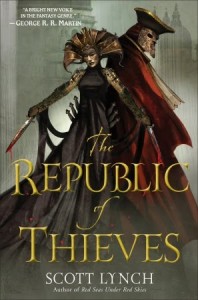
 Legions of fantasy readers were thrilled earlier this month by the announcement that The Republic of Thieves, the (really) long-awaited third novel in Scott Lynch‘s Gentlemen Bastards Sequence, at last has a publication date (October 8, 2013). It’s been six and a half years since the last book’s release, in which time problems both personal and otherwise have beset the progress of the series.
Legions of fantasy readers were thrilled earlier this month by the announcement that The Republic of Thieves, the (really) long-awaited third novel in Scott Lynch‘s Gentlemen Bastards Sequence, at last has a publication date (October 8, 2013). It’s been six and a half years since the last book’s release, in which time problems both personal and otherwise have beset the progress of the series.
Despite those delays, early indications are that the enthusiasm for the book had dampened little if at all. So what has kept anticipation so high, even when it seemed for a time that we might never see this book published?
It’s a no-brainer as far as I’m concerned, because the first two books of the series were among the very best books I’ve ever read. They’re ridiculously entertaining mash-ups of the gritty crypto-historical fantasy of George R.R. Martin, high-spirited heist films like Ocean’s Eleven and The Italian Job, and the earthy, life-among-the-lowlifes profanity of Quentin Tarantino.
Believe me on this: if you take none of my other reading recommendations, heed this one and introduce yourself to Locke Lamora and the Gentleman Bastards, a crew unlike any other in literature.
 The reading public first met the Gentleman Bastards in 2006, in Scott Lynch’s unusually accomplished and self-assured debut novel The Lies of Locke Lamora. Set in Camorr, a city of canals highly reminiscent of Renaissance-era Venice, Lies introduces con-man extraordinare Locke Lamora. Raised by a brutally wise old thief called Chains, Locke has been ridiculously successful at his chosen profession, so much so that money isn’t a motivation any more—he’s got more wealth locked away as a result of his scams than anyone could use in a dozen lifetimes. No, for Locke the challenge is the thing, and along with the Gentleman Bastards, his talented “found family” of fellow thieves and tricksters—massive but sweet-hearted Jean, the twins Calo and Galdo, and the spunky apprentice called Bug—he plans ever more elaborate and impossible ways to part the very highest echelons of Camorran society from their gold and jewels.
The reading public first met the Gentleman Bastards in 2006, in Scott Lynch’s unusually accomplished and self-assured debut novel The Lies of Locke Lamora. Set in Camorr, a city of canals highly reminiscent of Renaissance-era Venice, Lies introduces con-man extraordinare Locke Lamora. Raised by a brutally wise old thief called Chains, Locke has been ridiculously successful at his chosen profession, so much so that money isn’t a motivation any more—he’s got more wealth locked away as a result of his scams than anyone could use in a dozen lifetimes. No, for Locke the challenge is the thing, and along with the Gentleman Bastards, his talented “found family” of fellow thieves and tricksters—massive but sweet-hearted Jean, the twins Calo and Galdo, and the spunky apprentice called Bug—he plans ever more elaborate and impossible ways to part the very highest echelons of Camorran society from their gold and jewels.
In Camorr, there is honor among thieves, of a sort. The underworld operates under the oversight of a sort of thief king, the powerful Capa Barsavi, with whom Locke and the Bastards have an… interesting relationship—Locke doesn’t exactly toe the Capa’s line, but he’s charmed Barsavi into kind of letting him get away with it (in a way that makes the otherwise scary underworld boss just another of Locke’s patsies).
Lynch quickly makes Locke and the Bastards among the most engaging rogues in all of literature. They swear, they scheme, they swashbuckle their way through all manner of unexpected (and occasionally life-threatening) snafus, and on the whole are just having such an obviously tremendous time doing what they do that the reader can’t help but get swept up in the fantastically fun (if naughty) hijinks.
But it’s not all fun and games in Camorr, alas. A mysterious new criminal, known only as the Gray King, has appeared on the scene, and his audacious, confrontational crimes against Camorrans on both sides of the law upset the order of the underworld and puts Locke and his people on defense. For the first time in his life, Locke is not in control of the situation, and things spiral even further out of control as all-out war threatens to erupt as a result of the Gray King’s machinations.
What makes The Lies of Locke Lamora such a satisfying read was the way that all through the early part of the book, Lynch distracts us with a seemingly unstoppable caper romp, with the skilled Bastards improvising their potty-mouthed way through a pretty compelling con, while in the background he is setting up the emotional dominoes that will pull the rug out from under us later in the book. It’s a feat of literary sleight-of-hand that he pulls off with as much skill as any number of bigger-name, more well-established authors. And make no mistake, that rug will get pulled. Lynch follows in the footsteps of George R.R. Martin when it comes to narrative brutality, to that sense of “Oh, he wouldn’t, he couldn’t, holy crap he did!!”
 And that’s all I can say without ruining the very many gripping surprises that keep The Lies of Locke Lamora barrelling along with the momentum of a runaway mine tram. And that’s also why I can’t say anything about the second volume, Red Seas Under Red Skies, without giving away how the first book ends. All I can tell you is that book two was unquestionably up to the standard set by the first, continuing the mix of high-flying caper plotting and gut-punching emotional drama while genuinely progressing the personal story arcs of the characters.
And that’s all I can say without ruining the very many gripping surprises that keep The Lies of Locke Lamora barrelling along with the momentum of a runaway mine tram. And that’s also why I can’t say anything about the second volume, Red Seas Under Red Skies, without giving away how the first book ends. All I can tell you is that book two was unquestionably up to the standard set by the first, continuing the mix of high-flying caper plotting and gut-punching emotional drama while genuinely progressing the personal story arcs of the characters.
Two amazing books in, neither the story nor the characters have lost any of their appeal, which is what made the seemingly interminable wait for The Republic of Thieves so difficult to endure. It was frustrating to think that Lynch might have sprung this amazing, addictively readable story upon us and then proven unable to follow through on the implicit promise of his opening. But now that a release date has finally been announced, I’m inclined to be optimistic. After all, personal problems aside, Lynch has shown no indication that he’s either willing or able to write something that is less than entertaining.
So, as I advised above, give yourself the gift of fantasy’s most enjoyable bunch of ne’er-do-wells—you have about six months to get caught up on the shady but delightful dealings of Locke Lamora and the Gentleman Bastards.